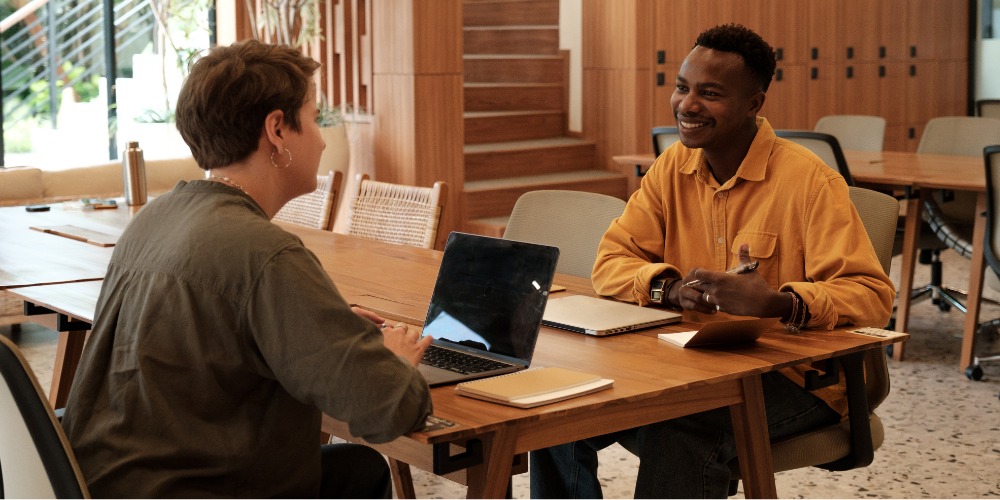By Pete Budworth
•
October 29, 2024
There are lots of great candidates on the market right now—great news if you’ve got urgent hiring needs! While it might mean you’re opting to run the recruitment process yourself, here are some tips to help protect your brand and support those out there in the trenches, working hard to get back in the game. We all know how tough it is for candidates right now, so it’s more important than ever to uphold ethical practices and give every candidate a positive experience, even if they’re not the right fit for your role. Hopefully, by reading this, you're joining me on a journey to make a real difference in the way we approach recruitment. Be Prepared and Aligned from the Start This one might seem obvious but before starting the interview process, make sure all the hiring managers and interviewers are aligned. Be clear on what you’re looking for in a candidate, how many interview rounds there will be, whether there’s a task, and who will handle what questions. When everyone’s on the same page, not only do you create a smoother experience for candidates, but you also speed up the process, increasing your chances of finding the right person quickly minimising disruption to your project deadlines and over stretched team. Plus, it sends a clear message to candidates that - you value their time and respect their effort. For help on the interview itself you can read our tips on how to deliver a great interview experience. Set Expectations with Candidates Now that you’ve set internal expectations, it’s time to share them with candidates! It’s much easier for candidates to put their best foot forward when they know what to expect. A great interviewer considers the candidate’s circumstances—some may be feeling pressure from unemployment, others might be neurodivergent or anxious. Let’s not forget about the mass redundancies over the last 18 months! When you give candidates the tools to prepare, they can focus on showcasing their true skills instead of worrying about surprises. This levels the playing field and helps ensure you’re finding the best fit for the role, not just the best performer on interview day. Show Empathy and Understanding The job market is tough right now – I’m hear the term “wild west” all too often lately! Many candidates have been out of work for a while, through no fault of their own. A little empathy goes a long way. As the old adage goes – treat people the way you’d want to be treated. Ask about gaps in employment, but do it with curiosity, not judgment. Creating a safe space for candidates to share their story shows that your organisation values people, not just their resumes. After all, we’re all human. Be Transparent Transparency builds trust. Be upfront about what candidates can expect—not just from the recruitment process but from the role itself. Share the positives and the challenges. Being vulnerable will gain respect and helps candidates make informed decisions. It’s better to have someone opt out early than to hire someone who leaves after a few months because the role wasn’t what they expected. Feedback is Key This is probably one of the most talked-about (and frustrating) aspects of today’s job market. LinkedIn is full of posts from candidates who’ve been ghosted after interviews. My advice? Even if you don’t have a decision yet, let candidates know where they stand. Ghosting can leave a lasting negative impression—not just on the candidate but on your employer brand too. Providing even a small amount of constructive feedback can make a big difference. It doesn’t have to be lengthy; a positive note and a key reason why they weren’t selected can help candidates improve for next time and appreciate the process. And if you’ve forgotten to get back to someone (because, let’s be honest, we all get overwhelmed sometimes), own it. A simple, sincere apology goes a long way in closing the loop. What matters most is showing respect for their time and effort, even after the fact. Help Where You Can If a candidate isn’t the right fit, consider how you can help beyond a simple "no." If they impressed you, is there someone in your network who might be interested in their skillset? Could you make an introduction? A Simple Thank You Goes a Long Way Candidates are juggling jobs, rearranging childcare, and coming up with creative excuses to take time off for interviews (I’ve heard Michael’s had a lot of white goods delivered this week!). Whether they advance or not, they’ve invested time in your company, and a simple thank-you can leave a lasting positive impression. Check In: Are You OK? "Are You OK?" Day is a great reminder to check in on people’s mental health, but it shouldn’t just be once a year. With the pressures of today’s economy, many candidates are experiencing heightened stress. Acknowledging the strain of job searching or offering flexible interview timings can go a long way toward reducing stress. I love when clients share tips for managing interview anxiety—it's a small thing that makes a big difference. Reflect on the Process After each hire, take time to reflect on what worked and what didn’t. Did candidates get enough information upfront? Were timelines manageable, and was communication prompt? Asking for candidate feedback can be a great way to improve your process over time. This can even be a step you introduce during your onboarding process - here is some advice on how to successfully onboard your new hires. Being open to evolving is a core part of being a responsible and ethical employer. Building an empathetic hiring process doesn’t just benefit candidates—it strengthens your brand and helps you secure top talent. If you're ready to elevate your recruitment approach, reach out to one of our talent partners at iknowho for a chat.










